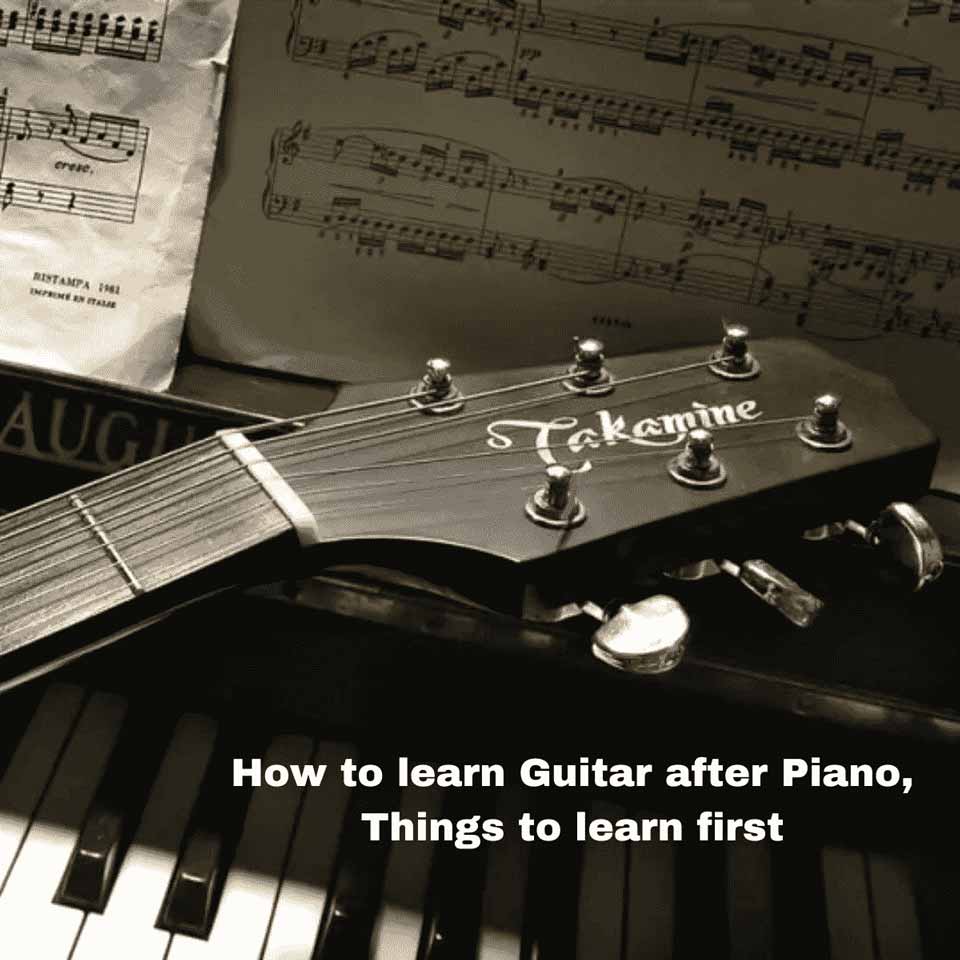Learning to play the guitar after already having experience playing the piano can offer a unique advantage. The skills acquired from playing the piano can be highly beneficial in understanding musical concepts, reading sheet music, and composing. The knowledge of music theory gained from playing the piano can be applied to the guitar, facilitating a faster learning curve. If you want to learn guitar after piano, disocver how prior piano experience can fast-track your guitar learning. Explore techniques, challenges, and tips for a successful transition. Start your musical journey today!
One of the advantages of already being a piano player is the familiarity with notes, scales, and chords. This familiarity can make it easier to grasp the fretboard layout and understand the relationship between different notes and chords on the guitar. Additionally, the ability to read sheet music and understand rhythm and timing can be transferred to the guitar, making it easier to learn new songs.
However, it’s important to recognize that playing the guitar has its own set of challenges. The technique required for playing chords and fingerpicking patterns can differ significantly from the piano. The hands and fingers face a new set of demands, requiring strength, dexterity, and precision to navigate chord patterns and positions on the guitar fretboard. Developing calluses on the fingertips is also necessary to build endurance and minimize discomfort while pressing down on the strings.
To begin learning the guitar, it’s crucial to start with a well-fitted instrument that feels comfortable to play. Visiting a music store or guitar center can provide an opportunity to try out different guitars and seek recommendations from experienced guitarists or instructors. Finding a guitar that offers good performance in terms of tone, resonance, and volume will enhance the overall playing experience.
Starting Your Guitar Journey and Practice Tips:
When starting out, there are numerous online resources available that offer beginner lessons. However, it’s important to choose reliable and comprehensive learning aids that provide a solid foundation in guitar playing. Seeking guidance from a qualified guitar teacher or enrolling in structured guitar lessons can also accelerate the learning process and ensure proper technique and skill development.
Learning to play the guitar requires patience and dedication, similar to learning any other instrument. It takes time to become familiar with the instrument and develop the necessary muscle memory and coordination. It’s important to establish a regular practice routine and maintain discipline to make consistent progress.
When transitioning from piano to guitar, here are a few important things to focus on as you begin your journey:
- Hand Position and Technique: Familiarize yourself with proper hand position and technique on the guitar. Pay attention to hand posture, finger placement, and maintaining a relaxed yet controlled approach while playing.
- Note Reading on the Grand Staff: Get acquainted with reading notes on the grand staff, which consists of the treble and bass clefs. Practice identifying notes in both clefs and understanding their corresponding positions on the piano keys.
- Basic Chords and Chord Progressions: Start learning basic chords and chord progressions on the guitar. This will help you build a foundation for accompanying yourself or others while playing songs. Focus on major and minor chords and progressions commonly used in various music genres.
- Finger Independence and Coordination: Develop finger independence and coordination by practicing exercises that involve playing different notes with each finger of both hands. Gradually increase the difficulty of the exercises to challenge yourself and improve your overall dexterity.
- Scales and Key Signatures: Learn major and minor scales and their corresponding key signatures on the guitar. This will aid in understanding the relationship between keys, scales, and chords, and provide a framework for improvisation and musical exploration.
- Music Theory Concepts: Deepen your knowledge of music theory concepts specific to the piano, such as intervals, triads, seventh chords, and inversions. Understanding these concepts will expand your musical vocabulary and facilitate more sophisticated playing and composition.
- Ear Training and Sight-Reading: Practice ear training exercises to develop your ability to identify and play melodies and chords by ear. Additionally, work on sight-reading skills to become proficient in reading and playing music from sheet music, gradually increasing the difficulty level as you progress.
- Technique and Dynamics: Explore different piano techniques, such as legato, staccato, and various articulations. Additionally, focus on dynamics (playing softly and loudly) to add expression and emotion to your playing.
Here are some advantages to learn guitar after piano:
- Piano knowledge enhances understanding of chords, scales, and music structures, benefiting music theory comprehension on piano.
- Piano playing develops finger dexterity and coordination, aiding in the transition to the piano’s independent finger movements.
- Proficiency in both guitar and piano expands repertoire and versatility across various music genres.
- Prior music notation and sight-reading skills from guitar playing facilitate faster learning of piano pieces.
- Guitar offers a wide range of expressive possibilities with polyphonic capabilities, enabling intricate harmonies and dynamics.
- Transitioning to piano enhances compositional and arrangement skills, providing new perspectives for songwriting and music production.
- Accompaniment and harmonic understanding acquired from guitar playing can be applied to the piano, enabling more intricate and diverse accompaniments.
Also check:
5 Most Easy songs for beginner guitarists with Chords / tabs
